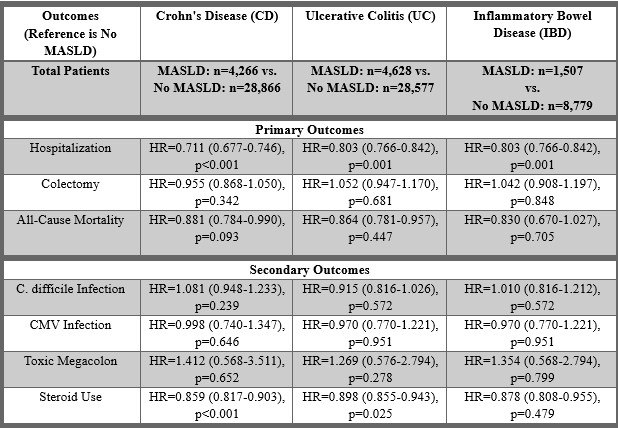Sunday Poster Session
Category: IBD
P1038 - MASLD Does Not Worsen Outcomes in IBD: A Retrospective Cohort Analysis
Sunday, October 26, 2025
3:30 PM - 7:00 PM PDT
Location: Exhibit Hall

Antoine Boustany, MD
Division of Gastroenterology, Department of Internal Medicine, University of Florida College of Medicine
Jacksonville, FL
Presenting Author(s)
Antoine Boustany, MD1, Chidera Onwuzo, MBBS2, Somtochukwu Onwuzo, MD3, Rashid Abdel-Razeq, MD4, Aravinthan Vignarajah, MD5, Ahmad Ghanem, MD6, Elias Wakim, MD7, Anvit Reddy, DO8, Gerardo Diaz Garcia, DO8, Imad Asaad, MD9
1Division of Gastroenterology, Department of Internal Medicine, University of Florida College of Medicine, Jacksonville, FL; 2SUNY Upstate Medical University Hospital, Syracuse, NY; 3Allegheny Center for Digestive Health, Pittsburgh, PA; 4Cleveland Clinic Foundation, Cleveland, OH; 5Department of Medicine, Cleveland Clinic Foundation, Cleveland, OH; 6Division of Nephrology and Hypertension, Mayo Clinic, Jacksonville, FL; 7Department of Medicine, HCA Florida Orange Park Hospital, Jacksonville, FL; 8University of Florida College of Medicine - 655 W 8th St Jacksonville, FL 32221UNITED STATES - Jacksonville, FL, Jacksonville, FL; 9Department of Gastroenterology, Firelands Health, Sandusky, OH
Introduction: Metabolic dysfunction-associated steatotic liver disease (MASLD) affects a significant proportion of the global and U.S. population and is associated with increased mortality. While IBD is known to contribute to metabolic disturbances and MASLD development, the reverse relationship of how MASLD affects IBD outcomes remains uncertain. This study aims to evaluate the impact of MASLD on IBD outcomes using real-world data.
Methods: A retrospective cohort study was conducted using the TriNetX database from January 2014 to January 2019. Cohort A included adult patients with Crohn’s Disease (CD) or Ulcerative Colitis (UC) and had a diagnosis of MASLD while cohort B included CD or UC patients without MASLD. Patients with the presence of hepatitis, hepatocellular carcinoma, and hepatic fibrosis were excluded. Propensity score matching was performed to balance confounders. Primary outcomes included hospitalization, colectomy, and all-cause mortality. Secondary outcomes included Clostridium difficile and cytomegalovirus infections, toxic megacolon, and steroid use.
Results: Data is outlined in Table 1. Among 33,132 Crohn’s Disease (CD) and 33,205 Ulcerative Colitis (UC) patients, 12.9% and 13.9% had MASLD, respectively. In CD, MASLD was associated with reduced hospitalization risk (HR=0.711, p< 0.001) and steroid use (HR=0.859, p< 0.001), with no significant differences in colectomy, mortality, or infection rates. Similarly, UC patients with MASLD showed lower hospitalization rates (HR=0.803, p< 0.001) and steroid use (HR=0.898, p=0.025). In the combined IBD cohort, MASLD was linked to a reduced hospitalization rate (HR=0.803, p=0.001). There was no significant difference in colectomy, mortality, or infection rates between MASLD and non-MASLD groups.
Discussion: While some studies suggest MASLD worsens IBD outcomes, others report inconsistent findings. In this study, MASLD was associated with lower hospitalizations in CD, UC, and IBD overall, and lower steroid use in CD and UC. Patients with MASLD often have more frequent follow-ups, which may lead to earlier interventions. The observed reduction in steroid use may reflect alternative treatment strategies prioritizing metabolic health. Further research is needed to explore these mechanisms.

Figure: Table 1: Patient Characteristics and Outcomes
Disclosures:
Antoine Boustany indicated no relevant financial relationships.
Chidera Onwuzo indicated no relevant financial relationships.
Somtochukwu Onwuzo indicated no relevant financial relationships.
Rashid Abdel-Razeq indicated no relevant financial relationships.
Aravinthan Vignarajah indicated no relevant financial relationships.
Ahmad Ghanem indicated no relevant financial relationships.
Elias Wakim indicated no relevant financial relationships.
Anvit Reddy indicated no relevant financial relationships.
Gerardo Diaz Garcia indicated no relevant financial relationships.
Imad Asaad indicated no relevant financial relationships.
Antoine Boustany, MD1, Chidera Onwuzo, MBBS2, Somtochukwu Onwuzo, MD3, Rashid Abdel-Razeq, MD4, Aravinthan Vignarajah, MD5, Ahmad Ghanem, MD6, Elias Wakim, MD7, Anvit Reddy, DO8, Gerardo Diaz Garcia, DO8, Imad Asaad, MD9. P1038 - MASLD Does Not Worsen Outcomes in IBD: A Retrospective Cohort Analysis, ACG 2025 Annual Scientific Meeting Abstracts. Phoenix, AZ: American College of Gastroenterology.
1Division of Gastroenterology, Department of Internal Medicine, University of Florida College of Medicine, Jacksonville, FL; 2SUNY Upstate Medical University Hospital, Syracuse, NY; 3Allegheny Center for Digestive Health, Pittsburgh, PA; 4Cleveland Clinic Foundation, Cleveland, OH; 5Department of Medicine, Cleveland Clinic Foundation, Cleveland, OH; 6Division of Nephrology and Hypertension, Mayo Clinic, Jacksonville, FL; 7Department of Medicine, HCA Florida Orange Park Hospital, Jacksonville, FL; 8University of Florida College of Medicine - 655 W 8th St Jacksonville, FL 32221UNITED STATES - Jacksonville, FL, Jacksonville, FL; 9Department of Gastroenterology, Firelands Health, Sandusky, OH
Introduction: Metabolic dysfunction-associated steatotic liver disease (MASLD) affects a significant proportion of the global and U.S. population and is associated with increased mortality. While IBD is known to contribute to metabolic disturbances and MASLD development, the reverse relationship of how MASLD affects IBD outcomes remains uncertain. This study aims to evaluate the impact of MASLD on IBD outcomes using real-world data.
Methods: A retrospective cohort study was conducted using the TriNetX database from January 2014 to January 2019. Cohort A included adult patients with Crohn’s Disease (CD) or Ulcerative Colitis (UC) and had a diagnosis of MASLD while cohort B included CD or UC patients without MASLD. Patients with the presence of hepatitis, hepatocellular carcinoma, and hepatic fibrosis were excluded. Propensity score matching was performed to balance confounders. Primary outcomes included hospitalization, colectomy, and all-cause mortality. Secondary outcomes included Clostridium difficile and cytomegalovirus infections, toxic megacolon, and steroid use.
Results: Data is outlined in Table 1. Among 33,132 Crohn’s Disease (CD) and 33,205 Ulcerative Colitis (UC) patients, 12.9% and 13.9% had MASLD, respectively. In CD, MASLD was associated with reduced hospitalization risk (HR=0.711, p< 0.001) and steroid use (HR=0.859, p< 0.001), with no significant differences in colectomy, mortality, or infection rates. Similarly, UC patients with MASLD showed lower hospitalization rates (HR=0.803, p< 0.001) and steroid use (HR=0.898, p=0.025). In the combined IBD cohort, MASLD was linked to a reduced hospitalization rate (HR=0.803, p=0.001). There was no significant difference in colectomy, mortality, or infection rates between MASLD and non-MASLD groups.
Discussion: While some studies suggest MASLD worsens IBD outcomes, others report inconsistent findings. In this study, MASLD was associated with lower hospitalizations in CD, UC, and IBD overall, and lower steroid use in CD and UC. Patients with MASLD often have more frequent follow-ups, which may lead to earlier interventions. The observed reduction in steroid use may reflect alternative treatment strategies prioritizing metabolic health. Further research is needed to explore these mechanisms.

Figure: Table 1: Patient Characteristics and Outcomes
Disclosures:
Antoine Boustany indicated no relevant financial relationships.
Chidera Onwuzo indicated no relevant financial relationships.
Somtochukwu Onwuzo indicated no relevant financial relationships.
Rashid Abdel-Razeq indicated no relevant financial relationships.
Aravinthan Vignarajah indicated no relevant financial relationships.
Ahmad Ghanem indicated no relevant financial relationships.
Elias Wakim indicated no relevant financial relationships.
Anvit Reddy indicated no relevant financial relationships.
Gerardo Diaz Garcia indicated no relevant financial relationships.
Imad Asaad indicated no relevant financial relationships.
Antoine Boustany, MD1, Chidera Onwuzo, MBBS2, Somtochukwu Onwuzo, MD3, Rashid Abdel-Razeq, MD4, Aravinthan Vignarajah, MD5, Ahmad Ghanem, MD6, Elias Wakim, MD7, Anvit Reddy, DO8, Gerardo Diaz Garcia, DO8, Imad Asaad, MD9. P1038 - MASLD Does Not Worsen Outcomes in IBD: A Retrospective Cohort Analysis, ACG 2025 Annual Scientific Meeting Abstracts. Phoenix, AZ: American College of Gastroenterology.
